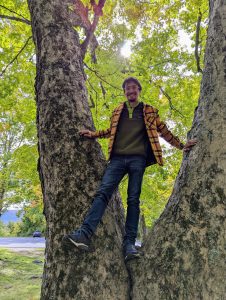 Undergraduate education during the pandemic was uncharted territory for everyone. Samuel Kocurek ’23 (CLAS) turned to nature during the pandemic, and this, along with other opportunities, including a summer 2022 internship with UConn Extension, led to his career focus.
Undergraduate education during the pandemic was uncharted territory for everyone. Samuel Kocurek ’23 (CLAS) turned to nature during the pandemic, and this, along with other opportunities, including a summer 2022 internship with UConn Extension, led to his career focus.
Kocurek started with general education classes, and joined Eco-House, declaring a dual degree in environmental science and math, with a minor in women’s, gender, and sexuality studies in the fall of 2020 after spending the summer hiking, gardening, and enjoying the outdoors with his mother.
“I truly believe in developing a personal relationship with the land,” Kocurek says. “So, when I saw UConn Extension offering this internship I was immediately hooked. With this work, I aided a professor and doctoral student in developing an ecotypic seed supply chain to revegetate highway roadsides with native plants. Ecotypic seed refers to native plant ecotypes that are grown and processed here in New England. It results in better erosion control, better pollinator health, greater plant longevity, less invasive plants, among others. The list goes on about the benefits of using native plants.”
The Extension internship, mentored by Julia Kuzovkina and John Campanelli, in the Department of Plant Science and Landscape Architecture, helped Kocurek focus his interests and built upon his experiences working in the Office of Sustainability and with other initiatives on campus. He contributed to the grant project that the team started in early 2022.
Their work included studying mowing patterns and how to best mow for pollinators and native plants. Beautiful plants and wildflowers proliferate along roadsides when mowing is reduced. “Having the opportunity to make our drives more ecologically authentic for ourselves, pollinators, and wildlife has been extremely meaningful, as was impacting the Department of Transportation. I am learning so much about the land we inhabit and about the beautiful plants that we often take for granted,” he continues.
Kocurek’s internship provided perspective on his senior year choices. The regional work drove him to expand his impact senior year. He continued working with the Office of Sustainability to improve their certification applications for UConn and re-started the Soil and Water Conservation Society because the internship made him realize its importance. Kocurek applied for graduate schools for an environmental management masters and was accepted to many. He is joining the University of Michigan’s Masters of Sustainability and Development in August, and further narrowing his focus in graduate school.
The grant work continued beyond the length of the internship, and Kocurek wanted to be part of that too. He finished the focus group interviews in August and asked about staying involved, working until early February when the team published a peer reviewed article in Sustainability on their research and extension initiatives.
Kocurek was also part of UConn@COP 27, continued working with the Office of Sustainability, and was the SRA in Charter Oak. The global scale he experienced demonstrated the complexity of how far climate change stretches, and he wants to influence humanity, but also enjoys working with communities as he did during his Extension internship.
“I want to lead sustainability initiatives in future,” Kocurek concludes. “I’ve learned a lot from my mentors and sustainability work over the last four years. The more I learn the more I feel I can do anything. The world is open.”
This work relates to CAHNR’s Strategic Vision area focused on Fostering Sustainable Landscapes at the Urban-Rural Interface
Article by Stacey Stearns